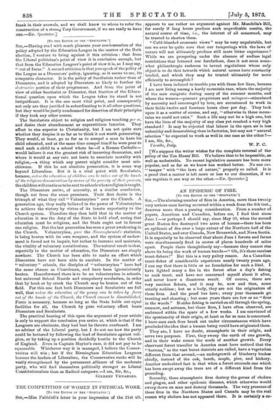THE COMPETITION OF WOMEN IN PHYSICAL WORK. (To THE EDITOR
OF THE "SPECTATOR:] Sue,—Miss Faithfull's letter in your impression of the 21st ult.
appears to we rather an argument against Mr. Muudella's
for surely if long hours produce such unprofitable results, the- natural course of time, i.e., the interest of all concerned, may be trusted to shorten them.
"Cold-blooded economic views" may be very unpalatable, but can we ever be quite sure that our tamperiugs with the laws of nature will not ultimately produce still more bitter experiences ?. While we are prospering under the absence of endless legal restrictions that fettered our forefathers, does it not seem some- what philanthropic rashness to invent regulations whose only object is to do that towards which natural causes have constantly tended, and which they may be trusted ultimately far more efficiently to accomplish?
I have been induced to trouble you with these few lines, because I am now living among a hardy mountain race, where the majority. of the men emigrate during many of the summer months, and where the women—peasant proprietors and maayers—atimulated, by necessity and encouraged by love, are accustomed to work in their fields twelve and fourteen hours clear per day. They look upon it as a matter of course, and say, "Otherwise in these moun- tains we could not exist." Such a life may not be a high one, but have the lives of the majority of any class yet reached a very high standard ? It may be objected that labour in the open air is less. unhealthy and demoralising than in factories, but may not "natural selection" be expected to work as well in one case as the other ?— I am, Sir, &c., [We suppose the writer wishes for the complete reversal of the- policy of the Ten Hours' Bill. We believe that to be impossible, as- well as undesirable. No recent legislative measure has been more popular, and as far as we know has worked better. No one can " tamper " with "the laws of nature," properly so called. It is a proof that a matter is left more or less to our discretion, if we- can regulate it one way or the other.—En. Spectator.]


































 Previous page
Previous page